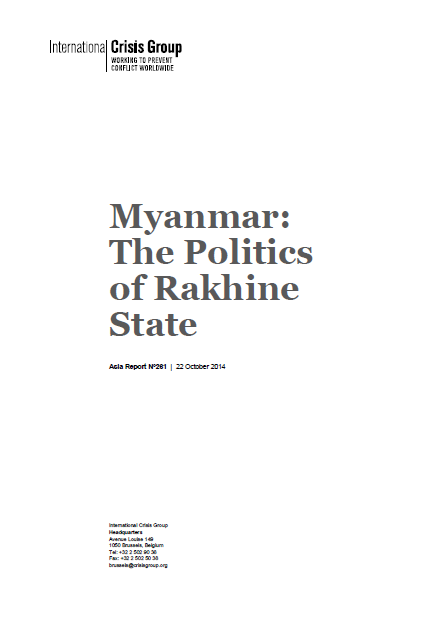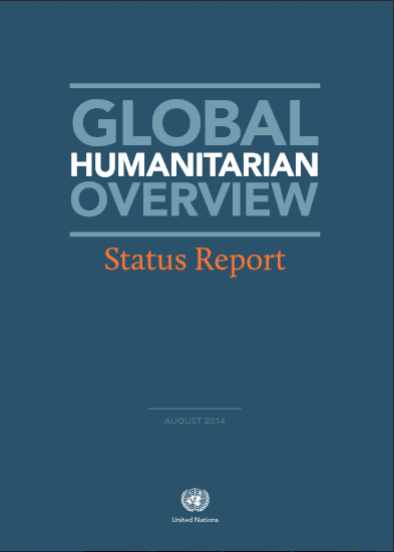Posts Tagged ‘Humanitarian Assistance’ (73 found)
Press Release: U.S. Embassy Rangoon’s Ambassador Derek Mitchell’s Visit to Kachin State
Myitkyina – Ambassador Derek Mitchell visited Myitkyina, Kachin State October 25-27. This was Ambassador Mitchell’s third visit to Kachin State as Ambassador; his first visit was in December 2012 and his second visit was in October 2013. During his three day visit, Ambassador Mitchell met with more than 150 members of Kachin society, including religious leaders, local humanitarian workers, cultural historians, students, NGO leaders, political party […]
• • •Myanmar: The Politics of Rakhine State
The situation in Rakhine State contains a toxic mixture of historical centre-periphery tensions, serious intercommunal and inter-religious conflict with minority Muslim communities, and extreme poverty and under-development. This led to major violence in 2012 and further sporadic outbreaks since then. The political temperature is high, and likely to increase as Myanmar moves closer to national elections at the end of 2015. It represents a significant threat to the overall success of the transition, and has severely damaged the reputation of the government when it most needs international support and investment. Any policy approach must start from the recognition that there will be no easy fixes or quick solutions. The problems faced by Rakhine State are rooted in decades of armed violence, authoritarian rule and state-society conflict. This crisis has affected the whole of the state and all communities within it. It requires a sustained and multi-pronged response, as well as critical humanitarian and protection interventions in the interim […]
• • •Global Humanitarian Overview – Status Report
2014 has seen a major surge in humanitarian crises around the world. Inter-agency strategic response and regional response plans now target over 76 million people in thirty-one countries compared to 52 million in December 2013. 102 million people are estimated to be in need of humanitarian assistance compared to 81 million in December 2013. Global financial requirements to cover humanitarian needs rose from US$12.9 billion in 2013 to $17.3 billion now. More and more crises are having a regional impact with a spill-over effect on countries which are already fragile.
Five crises have been classified by Principals of the Inter-Agency Standing Committee as “L3 emergencies”. L3s are considered to be the highest level of crisis requiring sustained, top level, system-wide support focused on leadership and coordination to improve the effectiveness of humanitarian response efforts. The response to Typhoon Haiyan in the Philippines was declared an L3 emergency in November. An estimated 11.3 million people in nine regions of the Philippines were affected by Typhoon Haiyan. At least 6,201 people were killed and the force of the storm caused widespread destruction of homes and infrastructure in many towns […]
• • •Statement on Land and Natural Resource Management
The Karenni Civil Society Network (KCSN) organized a workshop on land and natural resource management on 18-20 October, 2013 at a location on the Thai-Karenni border. 48 participants from 16 local civil society groups attended the workshop and agreed to the following points […]
• • •Burma’s Ethnic Challenge: From Aspirations to Solutions
Important steps have been made in national reconciliation during the past two years. But promises and ceremonies will never be enough. The long-standing aspirations of Burma’s peoples for peace and justice must find solutions during the present time of national transition […]
• • •Rice Rations Being Changed for Refugees from Burma/Myanmar in November
After November, rice rations will be needs-based and community-managed in refugee camps in Thailand
Rice rations are being revised in refugee camps in Thailand following reductions in funding for humanitarian food aid and a transition to needs-based and community-managed humanitarian relief. These changes are being introduced by The Border Consortium (TBC), which provides humanitarian relief and development assistance to refugees and conflict-affected people from Burma/Myanmar […]
• • •One Year After the Violence Began: Civil Society Organisations Deeply Concerned by the Human Rights and Humanitarian Situation of Stateless Rohingya
The Rohingya, a stateless minority of Myanmar, have endured decades of abuse, persecution and discrimination. One year ago, on 3 June 2012, the massacre of ten Muslims travelling in Rakhine State, following the killing and reported rape of a Buddhist woman, marked the beginning of a series of violent attacks against the Rohingya and other Muslim communities. The violence of June and October 2012 resulted in countless deaths, destruction to property, large scale internal displacement and segregation within Rakhine state of Myanmar. Consequently, thousands of Rohingya have fled to Bangladesh, Thailand, Malaysia and
beyond […]
Action Needed On Humanitarian Aid Restrictions In Burma
As Cyclone Mahasen threatens millions of people in Bangladesh and Burma, including tens of thousands of internally displaced people (IDPs) in Rakhine State, Burma Campaign UK today called on the British government and international community to take action to force President Thein Sein to allow unrestricted humanitarian aid […]
• • •Burma: Cyclone Threatens Displaced Muslims
Burma’s government should take immediate action to evacuate to higher ground tens of thousands of Muslims displaced last year by ethnic cleansing in Arakan State in advance of a tropical cyclone in the Bay of Bengal, Human Rights Watch said today. Half of the approximately 140,000 ethnic Rohingya and Kaman Muslims displaced […]
• • •Joint Open Letter on Review of the European Union’s Joint Decision on Burma
Dear Minister,
We are writing to you regarding the upcoming review of the European Union’s joint decision on Burma/Myanmar and to call upon you to support the continuation of the state of suspended sanctions against Burma/Myanmar for an additional year.
While we acknowledge that positive steps have been taken by the government in Burma/Myanmar, we caution that reforms have not led to progress towards national reconciliation. Nor have they sought to stem the ongoing human rights abuses and impunity, which continue to be serious problems in the country […]
• • •










 All posts
All posts